+++ this is just an overview, not scientific research +++
female:pressure report 03.2015
the pdf report contains all numbers from single countings and other female:pressure facts
festivals – survey period 2014
festivals per country – survey period 2014
clubs – survey period 2014
clubs per country – survey period 2014
labels – survey period 2014
labels per country – survey period 2014
Counting organized by the female:pressure Trouble Makers, graphics by Madeleine Bloom, counted were: acts / artists, artist albums or releases.
Festival and club numbers were counted on festival websites, fb events, RA events, some label data was sent by the label, some was counted on the label website.
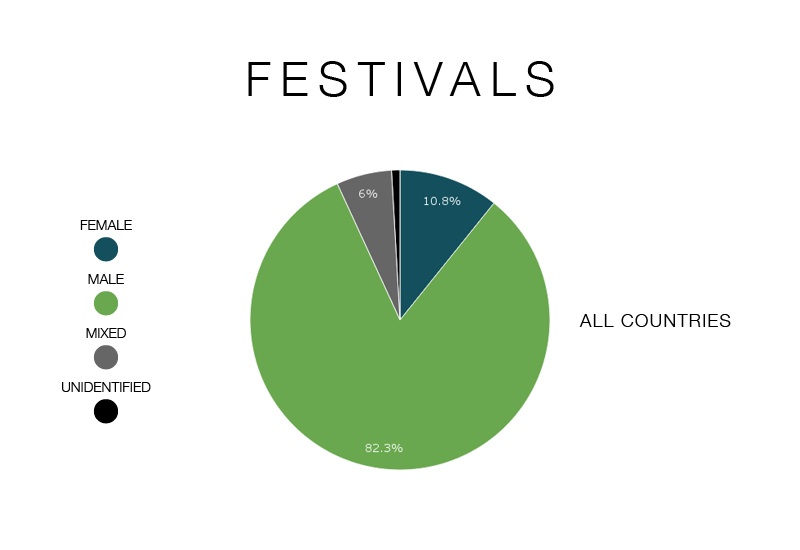
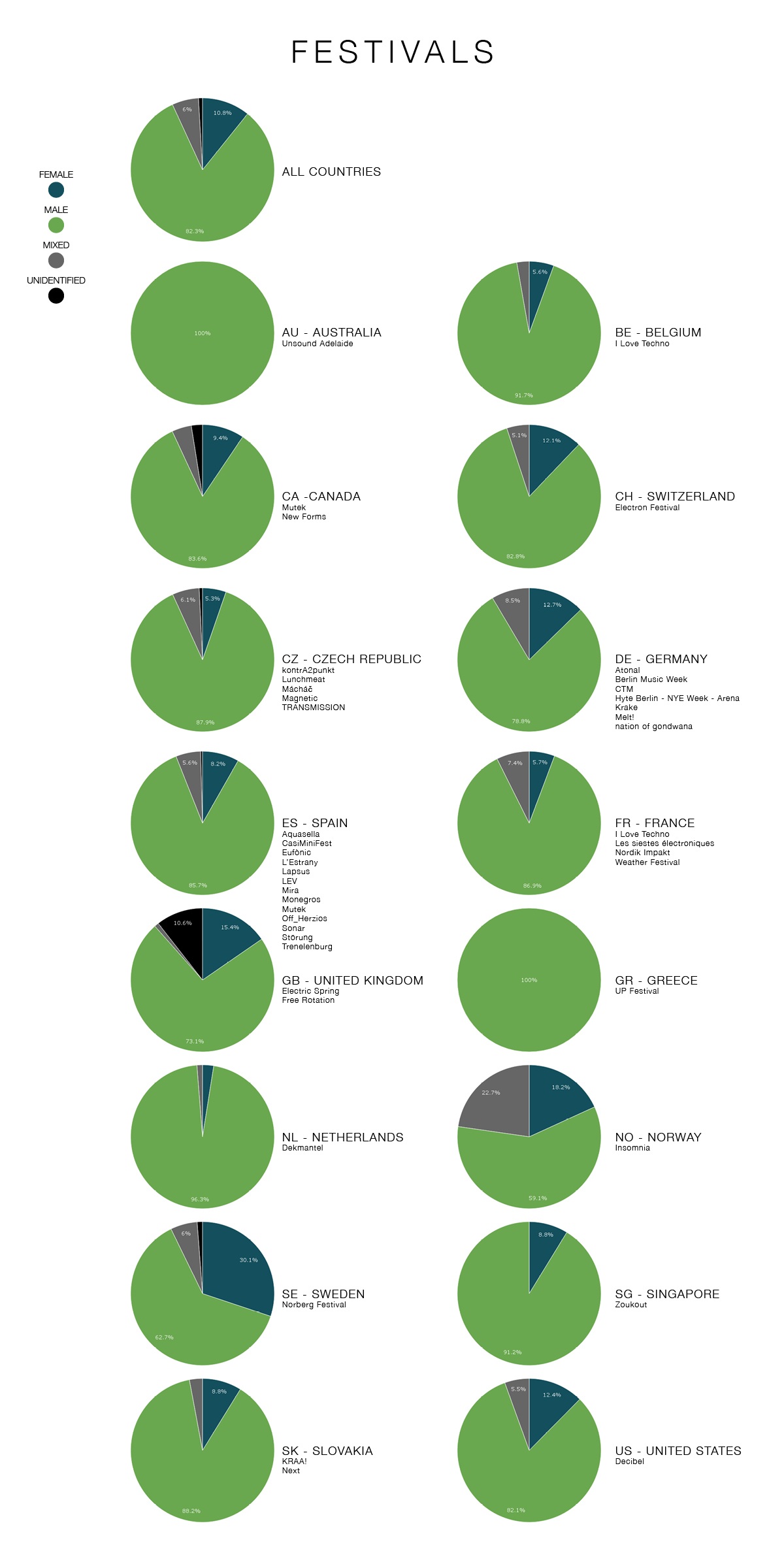
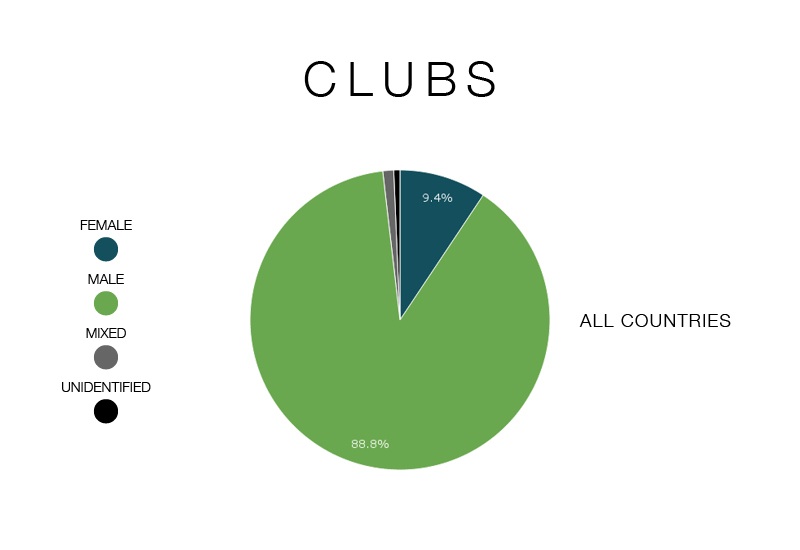
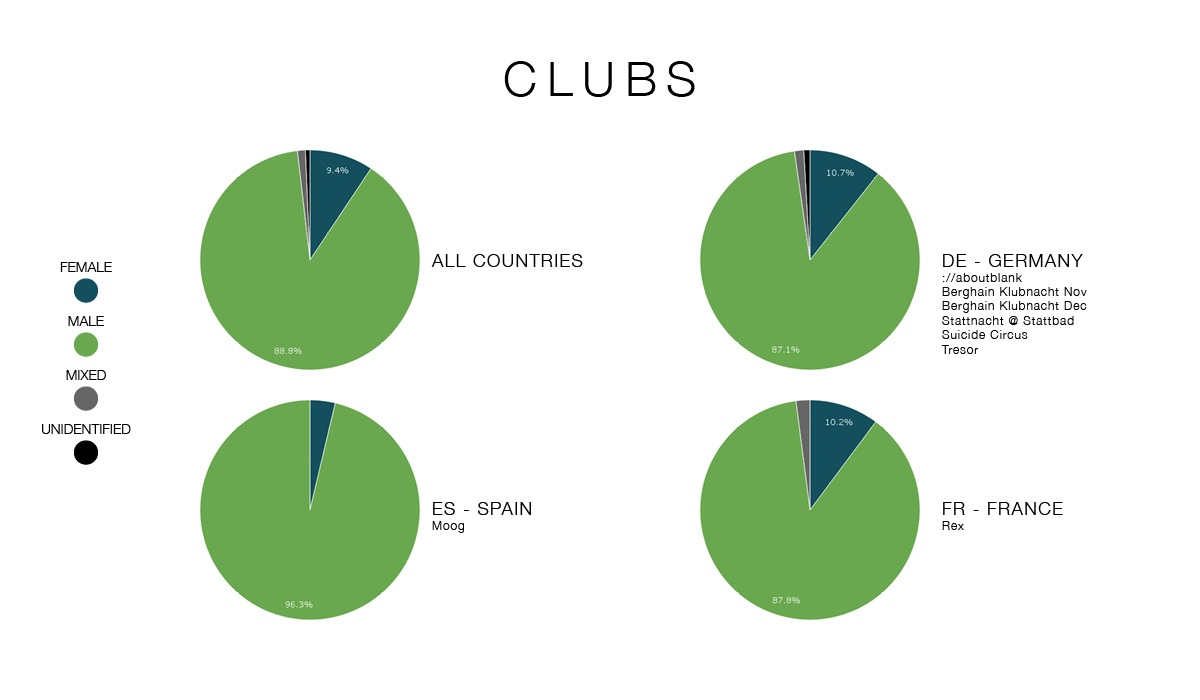
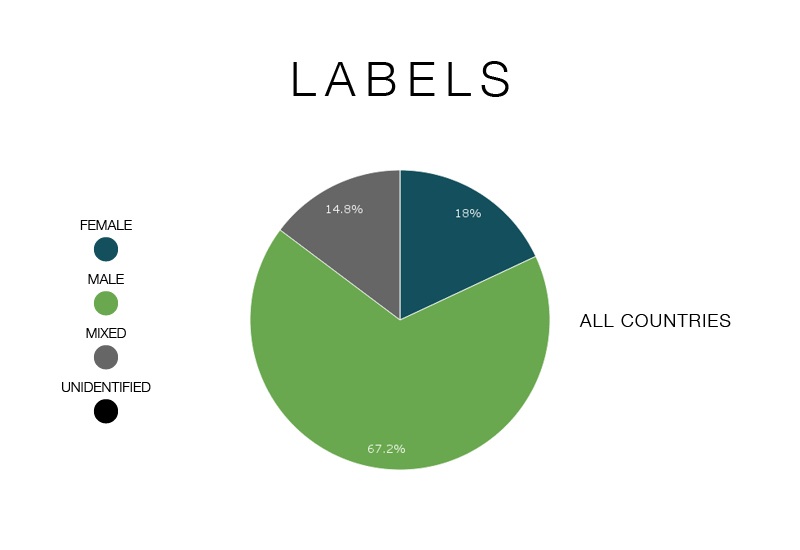
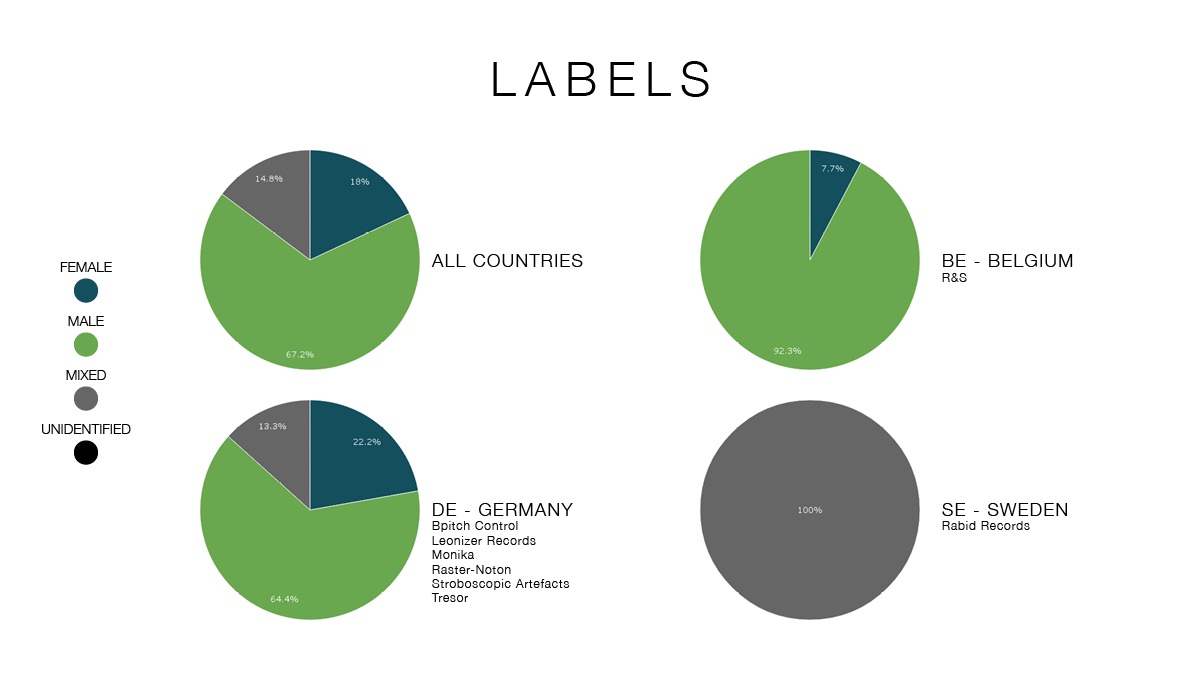
61 responses to “FACTS 2015 – Numbers”
[…] deutlich wie Männer dominiert die DJ-, Label- und Produzentenwelt im Jahre 2015 immer noch ist. Hier gibt es alle Fakten auf einen Blick und in Tortendiagrammen, hier ein sehr ausführliches […]
Important research, thanks. Will include this in a talk on gender and sound technologies this week.
Why is a pure number without any correlation always used as a sign of gender specific unequal chances? That’s like in the computer industry… less women are interested in that topic but activists construct a systematic oppression because of the number. I work with a female programmer, she’s great, she earns even more than some men in the company because she has the better grade and experience and she’s a valuable member of our team we would be much less without her. So yeah women can do that stuff but they are less interested in average.
Are there some, that want special benefit because of their gender or what is the reason?
I think you are missing the wider picture – there is absolutely no reason why computers should be a male-dominated domain, there is absolutely no reason why women would not be interested in computers, unlike other traditionally male-dominated areas or areas that require more physical strength, so why is the current situation the way you describe it? I was fascinated by computers between the ages of 10 and 16 – teaching myself programming, pulling them apart, and of course playing games – why didnt I go on and study in that area? From the age of 12 on in an all girls’ school we were non-stop encouraged to study “languages, languages, languages” – future is the EU etc., computers were barely mentioned. Meanwhile the boys of my generation in all boys schools were being told “computers, computers, computers” – the future is in computers etc. so I would say that might have something to do with it and until that changes we will never really know what women or men are genuinely interested in.
Hi, maybe the problem in your life was not the social pression, but that you went to a “girls school” that forced you to study “girls things”. Do you see the difference? Girls schools and Boys schools are not a main social problem, are a sexist family problem. That was your generation, but today generation are different, Girls and boys are programmers (just check the universities). So you are missing the wide picture: today everybody has the access and social support for study computing, so society is not the problem, but the families prejudices.
Your assessment of “less interest” is based on…what exactly? Do you have studies that show that women as a gender are specifically “uninterested” in technical fields as a function of their biology?
When women see a field where there are so few women, the message is quite clear: this field is not for you. When women see a field where women are told they are biologically uninterested or incapable of succeeding, I know it sounds crazy, but…they tend to feel unwelcomed, and therefore do not tend to pursue those fields in large numbers.
This is pretty basic logic, but when you are invested in the idea that bias doesn’t exist, I guess you’ll use any number of shitty, unsubstantiated arguments to defend your position.
There is the “Gender Equality Paradox” produced by Harald Eia, a documentary that interviews various scientists of biology, neuro-science and psychology as well as gender studies. British neuro-scientist Simon Baron-Cohen, who appears in that documentary for instance found in a study that children as young as a few months old already show gender differences and also has found significant greater affinity of the “male brain” to autistic behaviour. The name of that episode of the documentary comes from the discovering, that in countries with worldwide top-scores on gender equality, such as Norway, there are statistically less women in stereotypical male dominated fields than in countries with less score such as Arabic countries or in Africa. Eia wonders about the issue, that the more freedom women have the less they seem to pick activities that are not stereotypical.
In the documentary the interviewed representatives of gender studies become entangled in contradictions and leave psychologists and neuro-scientists puzzled about their unsophisticated answers to scientific research.
The counting provided by female:pressure won’t explain why there are less women represented in electronic music, although that does not stop them from suggesting systematic obstruction of female artists. Nowhere on these pages I find any derivation on this suggestion, just various numbers.
Those infographics are very revealing. Thanks for collating these stats, it’s really valuable work and a great starting point for talking about WHY this is the case, HOW the industry can evolve, and WHAT music buyers, bookers and labels can do to support and nurture female talent in the industry. I’m glad to be able to share this and your other posts.
On a slight tangent: I’d be interested to see similar representations of the women in technical roles in music (i.e. audio engineers, production, mix engineers and mastering) as I would bet the slices are even smaller.
@mindphuk Programming and music are separate industries with separate histories and structures, but I agree that women are underrepresented in both. Both present women with strong barriers to entry and progress, and generally the women who succeed in them are therefore extremely talented at what they do.
Where are these barriers? I was doing parties for 10 years and women always been welcome. In fact I saw women getting faster ahead getting more bookings than male peers in the same field. There might be much sexism in genres like hip hop but especially in electronic dance music, women and gays always been pretty welcome. Also women usually have it easier to network in music because they are generally more social, talk active and empathic than many men. Thats a good benefit for them. However it is not true that they are automatically more talented in the fields. My female co-worker is good, but not extremely better than good men. She is equal, an equal member of our team with her own skills and interest a good value but she’s not like the superfemgeek that no one else could reach. Also there are many good female DJs I liked to have on my lineups, not for their gender but for their qualities on the other hand there are also average and below average women, but they often get more support than men of the same qualities.
I asked, why mere numbers are always presented as proof for disadvantage, in both STEM and music. I didn’t get any grounded source on that claim. Women are also underrepresented in steel works, petroleum engineering, truck driving, waste collection, electricans, woodcutting, construction and much more. I still don’t see any programs to get more women in there, why?
Plus skateboarding, illustration, writing, playing guitar, rock climbing, 3D, design, etc. Women dont show up in most fields. Maybe the solution to feminism is to force women into doing these things.
[…] objective of the survey 2015 is to roughly quantify the current situation and expose the very real inequalities in this […]
This overview of this research is focusing on the wrong way. The point for REAL equality is equality between people, not between genders. And to reach this, first we have to know the percentage of artists (not pro, just artists) -at soundcloud for example- males and females. Without this information, we can’t say that festivals or clubs are not letting women work, because it’s very possible that the percentage of women artist and women at clubs/festivals is correct. Otherwise, if women artist presence in festivals is higher that women percentage as artists, there will be a sexist disfuction against men. That’s my thesis, hopo not to be lapidated because it’s very clear explained.
Thanks – somebody who can think
Dude, you’re not helping. True, Luisa made a good point about grassroots involvement vs top down counts. But having women represented at the top’s still important because those women can be seen as leaders, role models and ground breakers in their fields. Having prominent women in positive roles involved with electronic music will lead to more women at the grassroots/soundcloud level. By typing “Thanks – somebody who can think” you’ve just closed your metaphorical door on alternative opinions and missed the purpose of this article.
By also typing “Maybe the solution to feminism is to force women into doing these things” you’re showing a pretty bad level of sexism. Firstly, feminism doesn’t need a solution, feminism is not a problem. Secondly, why force women to do something when you can invite them?
Remember women make up >50% of the population in most countries (if not all the surveyed ones), if the world were an equal place we’d be ranked 2nd in terms of gender balance. Do you find that threatening?
^Yes, I’m a man and I’m not threatened about a cultural shift towards equality. No I don’t carry a beta-male victim mentality or alpha-male superiority complex. I value meaning and these stats highlight a huge proportion of untapped creativity. The more people we have sharing ideas, the better the standard of ideas we accept.
“those women can be seen as leaders, role models and ground breakers in their fields.”
What do you propose they do when there’s lack of actual women doing these things?
“you’ve just closed your metaphorical door on alternative opinions”
Nothing is closed, I just asked you how.
“why force women to do something when you can invite them?”
Tell that to feminism. Feminism is shaming women into doing things, not inviting them. My comment was tongue in cheek.
“I’m a man and I’m not threatened about a cultural shift towards equality.”
Equality as feminism presents it is toxic and misleading. It’s equality of outcome instead of equality of opportunity.
If you think that equality of opportunity will lead to equality of outcome, and that the lack of equality in outcome means we still dont have equality of opportunity, then you’re missing on sexual dimorphism and the fact that women and men are different, have different inclinations, different set of instincts, etc. By trying to push women into acting like men, and pushing men into not acting like men (so men-like women can have more space) you’re literally negating women.
Check my other comment
“skateboarding, illustration, writing, playing guitar, rock climbing, 3D, design, etc. Women dont show up in most fields.”
You are arguing that they dont show up because they dont feel invited, they dont see women there, they dont see leaders there so they dont feel inclined to join. You’re asserting that with no research and no knowledge or why women do things.
Here’s my view of things.
The way a man sees a leader and feels this urge to become as big so he can beat him and get his position is not the same urge a woman feels when she sees a leader. Different set of instincts. Women instead see “that bitch”.
Look for cases of people who locked down in a room for years and worked against all odds, suffering from social rejection, and kept going until they made it big. It’s all men (or all men as long as I can see)
There’s nothing “preventing” women from locking down and suffer shame and social rejection while they practice something in isolation until they are masters of it or have something to show for. They just dont do it – they value social acceptance way more. This wanting it more is why you think that having more women in those fields is important to women. Yet this is something women have that men dont – men usually go into the emptiness, to where no other man has gone, and create something new.
Why?
Because we’re different.
Because men only have value when they have achieved something. Because the common man has no value and nobody gives a shit about him and is disposable and has no respect from anybody. And the only shot at having value is to become someone.
While women have automatic value for being women, and here you are defending the place for unexisting women who havent achieved anything yet and blaming their lack of success on men who are actually working hard to do something.
IF you want to create the conditions for women to work as hard and to push for things against all odds – then society should start treating them like men and not giving them any respect until they have proven themselves. A woman without money = a loser. A woman that is not at the top = a loser (feminism tries that to some degree). But do you perceive how unnatural that “feels”? do you want to push down all women unless they can achieve great stuff?
Equality?
Or maybe do you want to embrace all men regardless of what they can achieve, to make men softer? hey dude you dont need to work out and you dont need anything, no job needed, your penis is just big enough, we love you because you’re a man and every man deserves respect! you can do no wrong! never hit a man, never say anything wrong about a man! oh boy you’re a gift to humanity, let me know if anyone hurts your feelings and we’ll make a big deal of it!
Well equality.
But tell me how would you do it. There are not enough women doing 3D. You think the lack of women at the top doing 3D is a problem. So what now?
How about all these other fields? I can make a huge list.
[…] one reason that women are so woefully underrepresented in electronic music—that is, as DJs, producers, promoters, label heads, sound technicians, mastering engineers, […]
[…] FACTS 2015 – Numbers. […]
There is a HUGE flaw in the argument that “if women don’t see women in XYZ (computer science, physics, hiphop, ….) then they are receive the message “no women need apply” and are put off/intimidated from trying to crash a boy’s club environment. The flaw? Look at law schools, medical schools, dental schools, and vet schools. All of these are either approaching 50% female enrollment or have passed it. If the “no visible women” argument were true then these programs would still be all-male preserves, just as they were up to a few decades ago.
I am so tired of these “women are underrepresented” arguments, not least when they come from men who have “raised” their consciousnesses. If this is the paramount goal then quit dissembling and come out for quotas. Just remember though that more tears are shed over answered prayers than unanswered ones. Guess who will be the first victims of quotas – it will be the young women who currently outnumber men in most colleges by up to 20% (60% to 40% is common in the lower-mid tier universities) and the minorities who are overrepresented in many elite universities – such as UC Berkeley, where Chinese ancestry students sometimes make up half the incoming class.
I’ve been going to music instruments stores for nearly 40 years and the paucity of women customers has been striking all those years and it hasn’t changed over the years. OTOH, women in classical music have come close to proportional representation. So as to the OP, get over it. If you want more women on club stages, get more women to play music that clubs want to book. It’s not a question of talent but of interest. Your interest is a feminist agenda that has nothing to do with music.
[…] vez una de las razones de que las mujeres son tan deplorablemente poco representadas en la música electrónica, esto es, que DJs, productores, promotores, jefes de sellos, técnicos de sonido, ingenieros de […]
[…] Cortesía de Female Pressure […]
[…] Die Initiative „female:pressure“ will das ändern. Ende der 90er-Jahre wurde sie von der DJane Electric Indigo gegründet und bietet unter anderem ein Verzeichnis weiblicher Akteure in der elektronischen Musik. Mittlerweile sind mehr als 1520 Frauen aus 66 Ländern gelistet. Als Reaktion auf die Aussage von Björk erstellten sie einen tumblr mit einer Fotosammlung von produzierenden Frauen, der von Antye Greie kuratiert wird. Regelmäßig veröffentlicht die Initiative zudem Zahlen über den Anteil von Frauen bei Festivals und in Club-Line-ups. […]
[…] which unites female electronic artists from different countries. female:pressure conducted a research proving the severe underrepresentation of women in electronic music and since 2013, they’re […]
[…] funds collected will be used to maintain the female:pressure database and a yearly research called FACTS. This informal survey maps the presence of women in festival line-ups, clubs, and record label […]
[…] From female:pressure’s 2015 survey […]
[…] clear for me, that women have always been under represented in electronic dance music. When a company enhances minority representation it quickly becomes […]
[…] de sellos y festivales en 2013, con la curiosidad de descubrir si habían cambiado las cosas. Una nueva medición para 2015 reveló que habían cambiado muy […]
[…] men make up more than 80 per cent of club and festival performers, according to a 2015 survey overview from an international network of female artists in electronic and digital arts called […]
[…] milieu de la production et du djing, les femmes sont moins représentées, par rapport aux hommes. Female:pressure publie des nombreux overviews sur ce sujet, on ne peut pas donc se voiler la face vis à vis de la disproportion numérique entre hommes et […]
[…] Aside from instability and button pressing, EDM has more sexism and misogyny than you can shake a stick at. As I wrote the content for the website I talked about above; How The Party Started: The Rise Of EDM I was disappointed at the lack of females within the nodes. Disappointed, sure, but not really all that surprised. Electronic dance music doesn’t have a problem with women, it has a problem with diversity in general and EDM is no exception. When you bear in mind the Youtube channels, festivals and artists that exploit the female figure in order to market their music it’s no wonder the ratio of females to males in the industry is so wildly uneven. […]
[…] Aside from instability and button pressing, EDM has some-more sexism and misogyny than we can shake a hang at. As we wrote a calm for a website we talked about above; How The Party Started: The Rise Of EDM we was unhappy during a miss of females within a nodes. Disappointed, sure, yet not unequivocally all that surprised. Electronic dance song doesn’t have a problem with women, it has a problem with farrago in ubiquitous and EDM is no exception. When we bear in mind a Youtube channels, festivals and artists that feat a womanlike figure in sequence to marketplace their song it’s no consternation a ratio of females to males in a attention is so wildly uneven. […]
[…] view makes up a depressing bigger picture of an electronic music scene blighted by inequality, with Female Pressure reporting that the number of female DJs booked for global events barely scrapes the 10 per cent […]
[…] They’ve Experienced Sexism In Music: Just take a look at these pie charts showing the ratio of men to women represented in music […]
[…] women making up only 11 percent of artists at electronic music festivals in 2015. In 2014, only 18 percent of electronic labels included women on their […]
[…] women making up only 11 percent of artists at electronic music festivals in 2015. In 2014, only 18 percent of electronic labels included women on their […]
[…] making up only 11 percent of artists at electronic music festivals in 2015. In 2014, only 18 percent of electronic labels included women on their […]
[…] Ein guter Schritt, der hoffentlich irgendwann nicht mehr notwendig sein wird. Doch wenn man sich das Ergebnis einer Studie von female:pressure ansieht, liegt eine 50:50 Buchung noch in weiter Ferne. Die Beteiligung weiblicher Acts, z.B. auf den Bühnen von Festivals, stagnierte 2015 in Deutschland bei immer noch erschreckend niedrigen 12,7 % (femalepressure.wordpress.com/facts-survey2015/). […]
[…] den durchschnittlich unterirdischen zehn Prozent wie sie etwa das Kollektiv female:pressure im Jahr 2015 auf internationalen Festivalbühnen erhoben hat, präsentiert das Electron 27% Frauen im Programm. Mit dabei unter anderem Aïsha Devi, Ajele, […]
[…] en cualquier latitud del mundo. Situémonos 2015, sonde apenas 11% de los eventos mundiales y 18% de los sellos especializados reclutaron a mujeres en sus catálogos. Lo anterior son cifras de female:presure, un colectivo […]
[…] producer’s chair is a goal the genre’s leaders need to embrace. Organizations like the female:pressure network are fighting for it. It is becoming clear that fans of this music want to hear what women […]
[…] male and female artists is generally fairly even these days—well, you are incorrect. Various research prove that females normally make up about ten % of electronic music lineups. So by supplying space […]
[…] hacia el género femenino. De acuerdo con la red Female Pressure, en 2014 tan sólo 18 por ciento del catálogo de estas compañías estaba integrado por mujeres. Sin una correcta […]
[…] le site female:pressure, un annuaire recensant les femmes Djs pour mieux aider à leur booking, s’est amusé à compter le nombre d’artistes féminines à l’affiche de quelques f…. Par exemple, l’édition belge d’I Love Techno ne comptait que 5,6% de femmes à […]
[…] Die Initiative „female:pressure“ will das ändern. Ende der 90er-Jahre wurde sie von der DJ Electric Indigo gegründet und bietet unter anderem ein Verzeichnis weiblicher Akteure in der elektronischen Musik. Mittlerweile sind mehr als 1900 Frauen aus 72 Ländern gelistet. Als Reaktion auf die Aussage von Björk erstellten sie einen tumblr mit einer Fotosammlung von produzierenden Frauen, der von Antye Greie kuratiert wird. Regelmäßig veröffentlicht die Initiative zudem Zahlen über den Anteil von Frauen bei Festivals und in Club-Line-ups. […]
[…] sich als Frauen während die Top 100-Liste von Resident Advisor lediglich 14 DJanes enthält. Hierzu veröffentlichte die Gruppe Female Pressure weitere Zahlen. Im Anschluss befragte sie daher die Panelist_innen direkt ihren Perspektiven und Ideen für […]
[…] Lezeres Des Vaderlands dit [https://lezeresdesvaderlands.wordpress.com/] . In de muziekwereld houdt female:pressure al enkele jaren statistieken bij over onder andere de aanwezigheid van vrouwelijke artiesten op […]
[…] van data. #lekkertellen noemde de blog De Lezeres Des Vaderlands dit. In de muziekwereld houdt female:pressure al enkele jaren statistieken bij over onder andere de aanwezigheid van vrouwelijke artiesten op […]
[…] [1] https://femalepressure.wordpress.com/facts-survey2015/ […]
[…] hatte female:pressure das erste Mal eine Statistik veröffentlicht, die die Missstände bezüglich Chancengleichheit und Sichtbarkeit von […]
[…] hatte female:pressure das erste Mal eine Statistik veröffentlicht, die die Missstände bezüglich Chancengleichheit und Sichtbarkeit von […]
[…] events remain an anomaly in the electronic music community. In 2015, female:pressure – a network of female, transgender, and non-binary EDM artists – published a […]
[…] events remain an anomaly in the electronic music community. In 2015, female:pressure – a network of female, transgender, and non-binary EDM artists – published a survey revealing […]
[…] events remain an anomaly in the electronic music community. In 2015, female:pressure – a network of female, transgender, and non-binary EDM artists – published a survey revealing […]
[…] events remain an anomaly in the electronic music community. In 2015, female:pressure – a network of female, transgender, and non-binary EDM artists – published a survey revealing […]
[…] events remain an anomaly in the electronic music community. In 2015, female:pressure – a network of female, transgender, and non-binary EDM artists – published a survey revealing […]
[…] events remain an anomaly in the electronic music community. In 2015, female:pressure – a network of female, transgender, and non-binary EDM artists – published a survey revealing […]
[…] events remain an anomaly in the electronic music community. In 2015, female:pressure – a network of female, transgender, and non-binary EDM artists – published a survey revealing […]
[…] le site female:pressure, un annuaire recensant les femmes DJs pour mieux aider à leur booking, s’est amusé à compter le nombre d’artistes féminines à l’affiche de quelques festi…. Par exemple, l’édition belge d’I Love Techno ne comptait cette année-là que 5,6% de […]
What percentage of all DJs (working & nonworking and not including karaoke or radio DJ definitions, rather club-style DJing only) are female? I’m also curious if this has changed over the years.
[…] System abheben möchte. Eine nicht-repräsentative Erhebung des Künstlerinnen-Kollektivs Female Pressure aus dem Jahr 2015 untermauert das Offensichtliche: Elektronische Musik ist Männersache. Lediglich […]